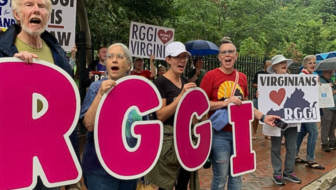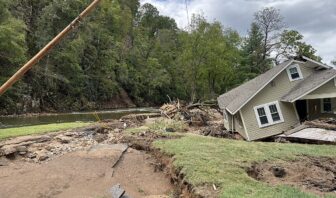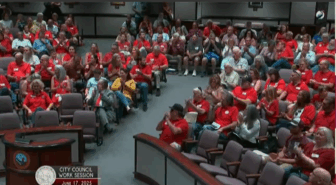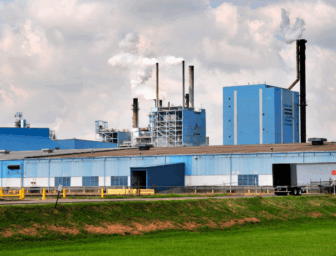CCAN Statement: “This was a needed win in these trying times”
FOR IMMEDIATE RELEASE: June 26, 2020
CONTACT:
Denise Robbins, Communications Director, denise@chesapeakeclimate.org, 240-630-1889
Anne Havemann, General Counsel, anne@chesapeakeclimate.org, 240-630-2146
Lauren Landis, Grassroots Coordinator, lauren@chesapeakeclimate.org, 757-634-9567
Richmond, VA — Today, the Virginia State Corporation Commission (SCC) issued a preliminary ruling against a controversial fracked-gas expansion project referred to as the “Header Injustice Project” by affected communities. Under the terms of the decision, the utility may re-apply for a permit but must comply with certain conditions that could prove extremely difficult to meet. If the utility, Virginia Natural Gas (VNG), can show by December 31, 2020, that its main customer — the 1050-megawatt C4GT gas plant — has the financing it needs to build, VNG must also submit information about needed environmental justice analyses and confirm that it will protect VNG’s customers from unnecessary rate increases.
The second condition related to cost protections might prove especially challenging for VNG to meet. To shield VNG’s customers from “holding the bag” for the costs of the project should the gas plant cease operation, the Commission is requiring that the capital cost of the project must be recovered over 20 years instead of the 70 years proposed. VNG’s own rebuttal testimony recognized that “[t]here is a very real risk that if the entire cost of the Project is required to be amortized over 20 years that the Project will be cost prohibitive and not be completed.”
The Commission found that there was a “very real risk” that C4GT might shut down before VNG fully recovered the costs of the Project. In its 2020 session, the Virginia General Assembly voted to join the Regional Greenhouse Gas Initiative (RGGI), which will raise the cost of all carbon-emitting facilities in Virginia, making it more difficult for merchant facilities like C4GT, which sell energy and capacity into the regional power grid, to make a profit.
The Chesapeake Climate Action Network and the Sierra Club, represented by Appalachian Mountain Advocates, intervened in the proceeding and consistently raised concerns about the potential impacts to ratepayers from the proposed 70-year cost-recovery period, among other issues. The Chesapeake Bay Foundation also intervened as did the Southern Environmental Law Center on behalf of Appalachian Voices and Virginia Interfaith Power & Light.
Anne Havemann, CCAN General Counsel, stated:
“This was a needed win in these trying times. The Header Injustice Project is so named because it is an absolute travesty in terms of environmental justice. Major components would go through majority-minority communities, and virtual hearings were held about an issue that would impact areas that have limited internet access. As a result, these communities, with little knowledge or say in the project, would have been the worst impacted by its harms: toxic air pollution, noise, threats of explosion. This is the textbook definition of environmental racism.
“But, at the end of the day, it was the arguments around need and cost that moved the needle. This decision recognizes that there is great risk in continuing investments in fossil fuel infrastructure and affirms that ratepayers should not be forced to subsidize these projects. Virginia is on the pathway to 100% clean electricity. Fracked gas should no longer enter the equation.
“We thank the SCC Commissioners who did the right thing today. The tide is turning in Virginia toward clean energy and toward justice. We hope that Governor Northam is paying attention and will use his authority to reject the other terrible fracked-gas projects proposed in the Commonwealth, including Dominion’s Buckingham Compressor Station.”
Additional information:
Virginia Natural Gas is calling the proposal the “Header Improvement Project.” But the organizations fighting it call it the “Header Injustice Project” because it would harm countless communities.
The proposal is for three new gas pipelines, totaling 24 miles, and three new or expanded gas compressor stations from Northern Virginia, through the middle of the state, and to the shore in Hampton Roads. The primary purpose of HIP is to supply gas to the C4GT merchant gas plant proposed for Charles County City. This merchant plant would be located about a mile from the proposed Chickahominy Power Station, a separate gas-fired merchant power plant that would be the largest in the state of Virginia. VNG wants this network of fracked-gas infrastructure to be up and running by the end of 2022.
The project has been tangled in justice concerns from the beginning. The massive gas plant the project is intended to serve is one of two such plants proposed to be built in a community with higher minority populations than the Virginia average. And one key component of the HIP project itself — the Gidley Compressor Station — is also proposed for a predominantly Black community. Yet there has been no environmental justice review carried out.
Furthermore, holding regulatory hearings for the project during the COVID-19 pandemic raised concerns in itself because internet coverage in the area surrounding the Gidley Compressor falls below the state average, leaving residents unable to access information and participate in the process. The first hearing on the HIP proposal was held up by technical issues.
##
A coalition called the Stop the Abuse of Virginian Energy (SAVE) Coalition has formed to stop this project. Learn more here: www.stophip.org.
The Chesapeake Climate Action Network is the first grassroots organization dedicated exclusively to raising awareness about the impacts and solutions associated with global warming in the Chesapeake Bay region. For 17 years, CCAN has been at the center of the fight for clean energy and wise climate policy in Maryland, Virginia, and Washington, D.C. To learn more, visit www.chesapeakeclimate.org





